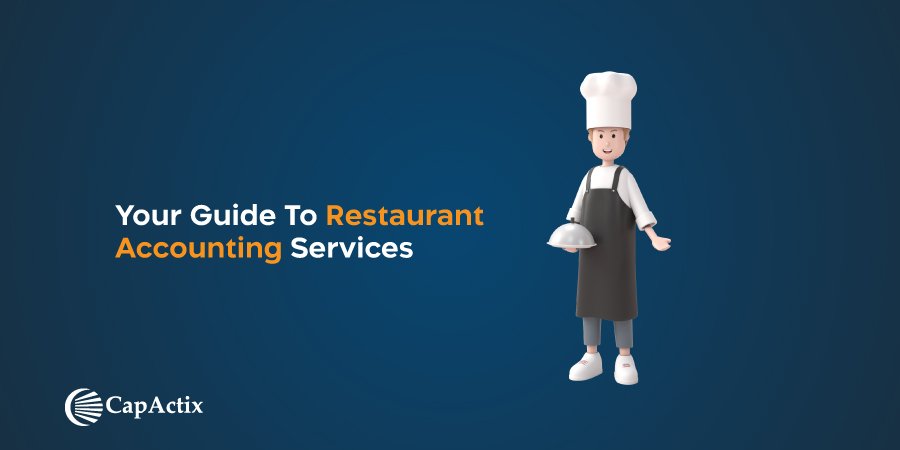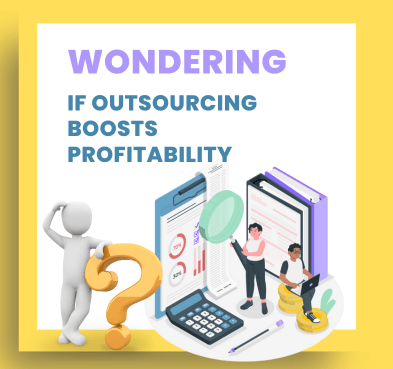One of the most critical components of running a successful restaurant is having practical accounting. Because restaurant profit margins are razor-thin, it’s crucial to maintain a close check on restaurant accounting services. 68% of restaurant professionals said they routinely review sales reports, 45% said they regularly review labor reports, 32% said they frequently review menu reports, and 17% said they never check any of these.
Bookkeeping is an often-overlooked component of restaurant management. Unfortunately, it’s difficult to catch up on your restaurant accounting after you’ve fallen behind. The restaurant industry’s profitability is too narrow to allow your bookkeeping to fall behind. If you don’t keep a close eye on your finances, it may be too late to correct problems when you notice them.
Selecting proper restaurant accounting solutions can help you avoid the complexities of restaurant accounting and effectively control your food expenditures. The majority of these systems contain financial software and point-of-sale (POS) systems to aid inventory management and transaction processing.
This article will explain the basics of how a skilled accountant may assist you in developing a reporting and growth strategy.
What Is Restaurant Accounting?
Restaurant accounting is a specialized branch of accounting that focuses on managing the financial activities of a restaurant business. It involves keeping track of the restaurant’s financial transactions, such as sales, expenses, payroll, and inventory, and preparing financial statements to provide owners and managers with insight into the financial health of the restaurant.
Effective restaurant accounting requires a deep understanding of the unique challenges and opportunities in the industry. For example, restaurants often have high overhead costs, fluctuating revenues, and complex tax requirements, which can make managing finances a challenge. Additionally, restaurant owners must also comply with strict health and safety regulations and maintain detailed records to ensure compliance.
To successfully manage restaurant accounting, it’s important to work with a skilled accountant who has experience in the industry. A professional accountant can help restaurant owners develop a customized accounting plan that meets their specific needs and goals. This may include implementing accounting software, developing a budget and cash flow forecast, and providing ongoing financial analysis to identify opportunities for growth and cost savings.
What Does a Restaurant Accountant Do?
A restaurant accountant is responsible for managing the financial aspects of a restaurant’s operations. Their primary role is to ensure that the restaurant’s financial records are accurate, complete, and up-to-date. Here are some of the main responsibilities of a restaurant accountant from an accountant’s point of view:
- Accounting
- Bookkeeping
- Financial Analysis
- Budgeting and Forecasting
- Tax Compliance
- Payroll Management
- Financial Reporting
- Consulting
- And many more
A restaurant accountant is responsible for managing the financial aspects of a restaurant’s operations. By providing valuable financial insight and guidance, a restaurant accountant can help restaurant owners make informed business decisions and achieve their financial goals.
Must read Top 13 Accounting Trends 2023 To Keep An Eye On
What Accounting Method Do Restaurants Use?
Restaurants use either the cash basis or accrual basis accounting method to record their financial transactions.
The cash basis method records transactions when cash is received or paid. This method is often used by small and simple businesses as it is straightforward and easy to understand. For example, if a restaurant receives cash for a meal, it records the revenue at the time of payment. Similarly, if the restaurant pays for supplies with cash, the expense is recorded when the payment is made. The cash basis method does not recognize accounts receivable or accounts payable, which means that it may not provide an accurate representation of the restaurant’s financial position at a given time.
The accrual basis method records transactions when they are incurred or earned, regardless of when cash is received or paid. This method is often used by larger and more complex businesses as it provides a more accurate representation of their financial position. For example, if a customer orders a meal, but pays at the end of the month, the revenue is still recorded at the time the meal was served. Similarly, if the restaurant orders supply but does not pay until the following month, the expense is still recorded in the current period. The accrual basis method recognizes accounts receivable and accounts payable, which means that it provides a better representation of the restaurant’s financial position at a given time.
The choice of accounting method depends on the restaurant’s specific needs and circumstances. Generally, small and simple restaurants may opt for the cash basis method due to its simplicity and ease of use. Meanwhile, larger and more complex restaurants may opt for the accrual basis method as it provides a more accurate picture of their financial position. Restaurant owners should consult with a skilled accountant to determine the best accounting method for their business and ensure that their financial records are accurate and compliant with relevant accounting standards.
Must read How is Outsourcing Restaurant Accounting Service a Cost-Effective Solution?
What You Need to Track
It’s essential that the records are already up-to-date for an eatery with a qualified accountant or simply searching for tax savings for restaurateurs.
It all starts with you, the restaurant bookkeeper. Whether you do your accounting or outsource your restaurant accounting services, staying on top of your day-to-day bookkeeping is critical if you want to stay ahead of the competition and make a profit.
I recommend that restaurant businesses track several key areas in accounting to ensure accurate financial records and effective financial management. Here are some of the main areas that a restaurant business should track:
1. Sales
Keeping track of your dealings, starting with your income, is at the heart of all money planning. It refers to your sales in the context of restaurant accounting services. Fortunately, outsourcing has progressed significantly. Long gone are the days when your waiter had to roughly jot down the orders on a notepad and stick it up to the chef’s window. A good outsourcing platform can help you track the sales, properly categorize them into personalized tabs & reconciliation of daily POS sales with books.
2. Cost of Goods Sold (COGS)
Restaurants need to track their COGS, which includes the cost of all ingredients and materials used to prepare menu items. By tracking COGS, restaurants can ensure that menu pricing is profitable and identify areas where costs can be reduced.
3. Labor Costs
Restaurants should track labor costs, including salaries, wages, benefits, and taxes for all employees. Tracking labor costs can help restaurants control expenses and identify opportunities to improve productivity.
4. Inventory
Restaurants should track their inventory levels to ensure that they have enough ingredients and materials to prepare menu items while minimizing waste and spoilage. This can also help identify any discrepancies or theft.
5. Accounts Receivable and Payable
Restaurants need to track their accounts receivable (money owed to the restaurant) and accounts payable (money owed by the restaurant) to ensure that their cash flow remains healthy.
6. Cash Flow
Restaurants should track their cash flow, which is the amount of cash coming in and going out of the business. By tracking cash flow, restaurants can ensure that they have enough cash to cover expenses and identify areas where cash flow can be improved.
7. Taxation
Restaurants need to track all taxes payable, including federal and state income taxes, payroll taxes, sales taxes, and any other taxes related to the business.
To-Do list for bookkeeping in restaurants
A to-do list for bookkeeping in restaurants can help you stay organized and ensure that you are staying on top of your financial responsibilities. From tracking sales and expenses to managing payroll and taxes, there are many tasks involved in restaurant bookkeeping.
1. Every day, keep track of sales using your POS
One of the first things you’ll need to learn is how to keep track of your sales. Many people feel that outsourcing for restaurants is an excellent way to keep track of everything.
• Keep track of how many sales you make each day
For each day, make a separate sales entry (not monthly or weekly). You’re simulating how cash and credit card deposits arrive at the restaurant’s bank using this way. The majority of eateries take credit cards and pay the bill every day. As a result, each batch will see a credit card payment or deposit impact your checking account independently.
You must examine how money enters your bank account and set up your restaurant accounting services to reflect that activity.
• Make a sales report with the information you’ve gathered
You’ll need to create a report that summarizes your daily sales to keep track of them.
A daily sales summary includes the majority of restaurant POS systems. If you want to tweak the report to receive more detailed information, you’ll have to engage with your POS system to do so.
• Make a sales journal daily
Establish a daily sales journal entry and a memorized purchase after you get a sales summary. Comparing profit and loss to past periods and years might also provide insight into how things are doing financially. Financial reporting in restaurants can mean the difference between winning and losing.
Must read Bookkeepers To-do List: 21 Bookkeeping Tasks You Should Perform Daily
2. Take advantage of accounting software
No matter what accounting software you opt for, remember that it must be personalized or at least best fitted for your business. This means that you should be able to simplify the data entry tasks, customize the invoices, freely track the regular incomes and expenses, and much more. Remember that you should be able to access your statements and data anytime and anywhere.
3. Payroll
Doing your payroll leads to an increased risk as a business person. The penalty and charges you may get charged if you report your payroll taxes erroneously or late might be substantial. If you do not outsource your payroll to an accounting firm, you get exposed to many risks.
Payroll outsourcing is a cost-effective and essential solution for ensuring consistent and dependable paychecks and accounting.
Every small restaurant owner should use restaurant accounting outsourcing for payrolls.
Preparing restaurant payroll can be difficult due to irregular work hours, multiple roles, and various pay kinds. It’s ideal to outsource your payroll or use payroll software to automate the process.
Must read 2023: Why you should consider Outsourcing Payroll Processing
4. Create a chart of accounts
Now coming to the next step, you need to properly organize the accounting system. What does this mean? You have to prepare a chart of accounts. On the chart, you need to chalk out the resources, debts, expenses, revenue, and the owner’s capital. While it is not limited to those categories, it is best to start from the foundation and create more specific categories moving up. This will help you evaluate the cash flows within the business.
If you don’t use financial statements in your restaurant accounting services, you’re blindly running your business. With the food industry’s razor-thin profitability, it’s critical to review your financial data frequently.
Sales vs. prices of merchandise supplied ratios and labor ratios should get considered by restaurants.
One ratio that many restaurants should think about is the premium cost, which seeks to keep food, beverage, and labor costs between 60 and 65 percent of total sales.
Must read How can Accounting Outsourcing Services boost your Hotel & Restaurant Business?
How to Avoid Common Restaurant Accounting Service Mistakes
Here are some tips for restaurant businesses to avoid common accounting service mistakes:
• Keep Track of All Expenses
Restaurant businesses should track all of their expenses, including small expenses like supplies and equipment. By tracking all expenses, restaurant owners can avoid underestimating costs and overestimating profits.
• Reconcile Bank Accounts Regularly
Restaurant businesses should reconcile their bank accounts regularly to ensure that their financial records are accurate and up-to-date. This will help to identify any discrepancies or errors before they become larger problems.
• Separate Personal and Business Expenses
It’s important for restaurant owners to keep their personal and business expenses separate. This can be done by having a separate business bank account and credit card. Mixing personal and business expenses can lead to confusion and inaccuracies in financial statements.
• Accurately Track Inventory
Restaurant businesses should track their inventory accurately to ensure that they have enough supplies to meet customer demand while minimizing waste and spoilage. This can be done by implementing a regular inventory management system and using software to track inventory.
• Keep An Eye On The Cash Flow
Cash flow is critical for restaurant businesses. Restaurant owners should keep track of cash flow regularly to avoid a cash crunch and difficulty paying bills and employees. This can be done by regularly reviewing cash flow statements and projections.
• Maintain Adequate Financial Records
Adequate financial records are essential for making informed business decisions and preparing tax returns. Restaurant businesses should maintain adequate financial records and keep them up-to-date to avoid errors, inaccuracies, and tax problems.
By following these tips, restaurant businesses can avoid common accounting service mistakes and ensure accurate financial statements. Additionally, working with a professional accountant or accounting service can help to ensure that restaurant owners have access to expert advice and guidance.
Why Outsource Restaurant Accounting Services For Your Business?
It can be enticing as a business person to take on all of the responsibilities; however, outsourcing your restaurant accounting services will relieve you of the stress and liability, allowing you to focus on the growth and administration of your restaurant.
Many additional factors go into restaurant accounting services, such as the POS system you choose, inventory controls, theft prevention, and cash management. The easy actions outlined above, on the other hand, will lay the groundwork for a robust bookkeeping system. As your business grows, you’ll need to adapt your bookkeeping system to meet your changing needs. Restaurant owners say that their overall labor expenses as a proportion of revenue are greater now than they were prior to the epidemic, according to 59% of operators. You can reduce your labor cost by outsourcing restaurant accounting services.
CapActix Business Solutions is ISO 27001-certified company that offshores your accounting and taxation clients to streamline the process for your firm. Outsource restaurant accounting services and make your finance procedure smooth and efficient.
If you’re looking for an outsource accounting company to help with your business finances, contact us today at biz@capactix.com. We offer a comprehensive range of accounting services that can save you time and money. Let us help you take your business to the next level.
















